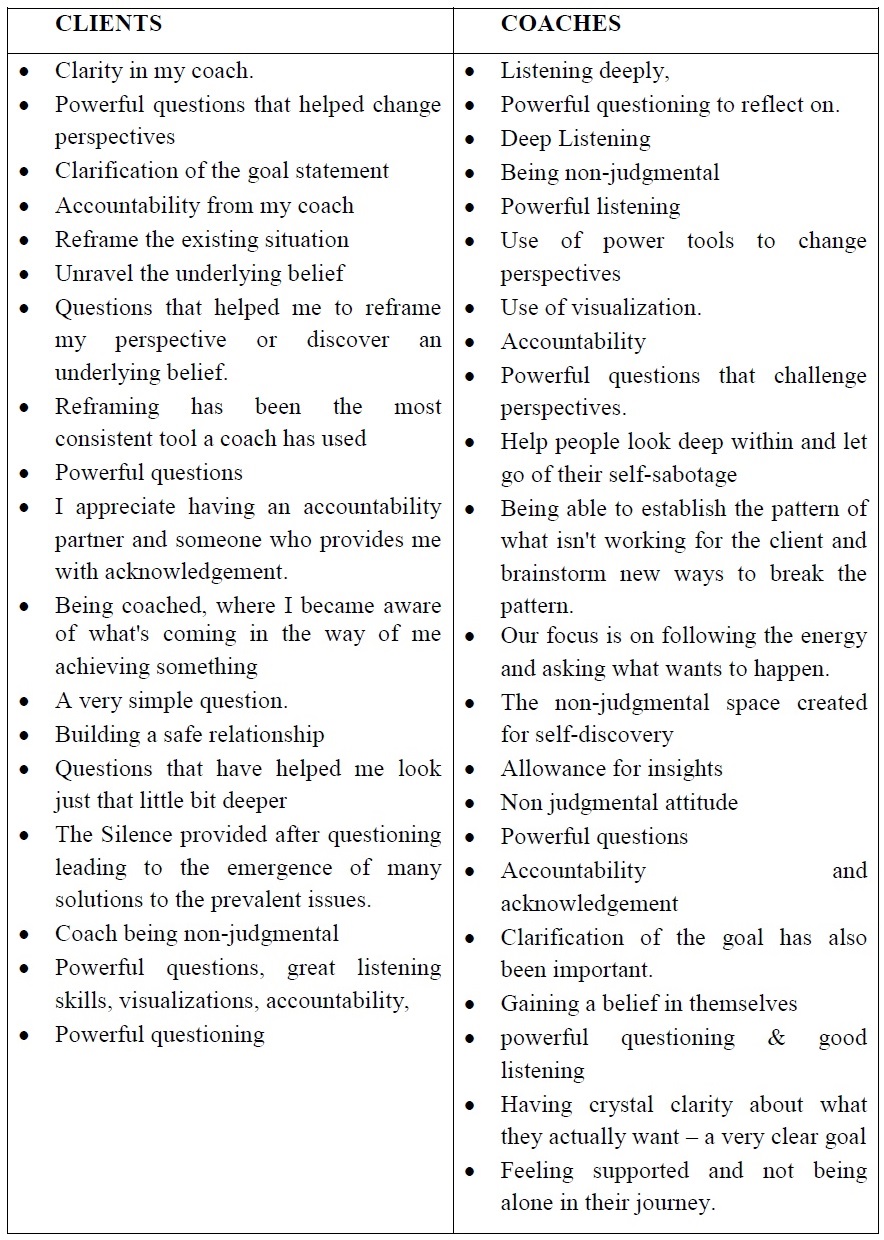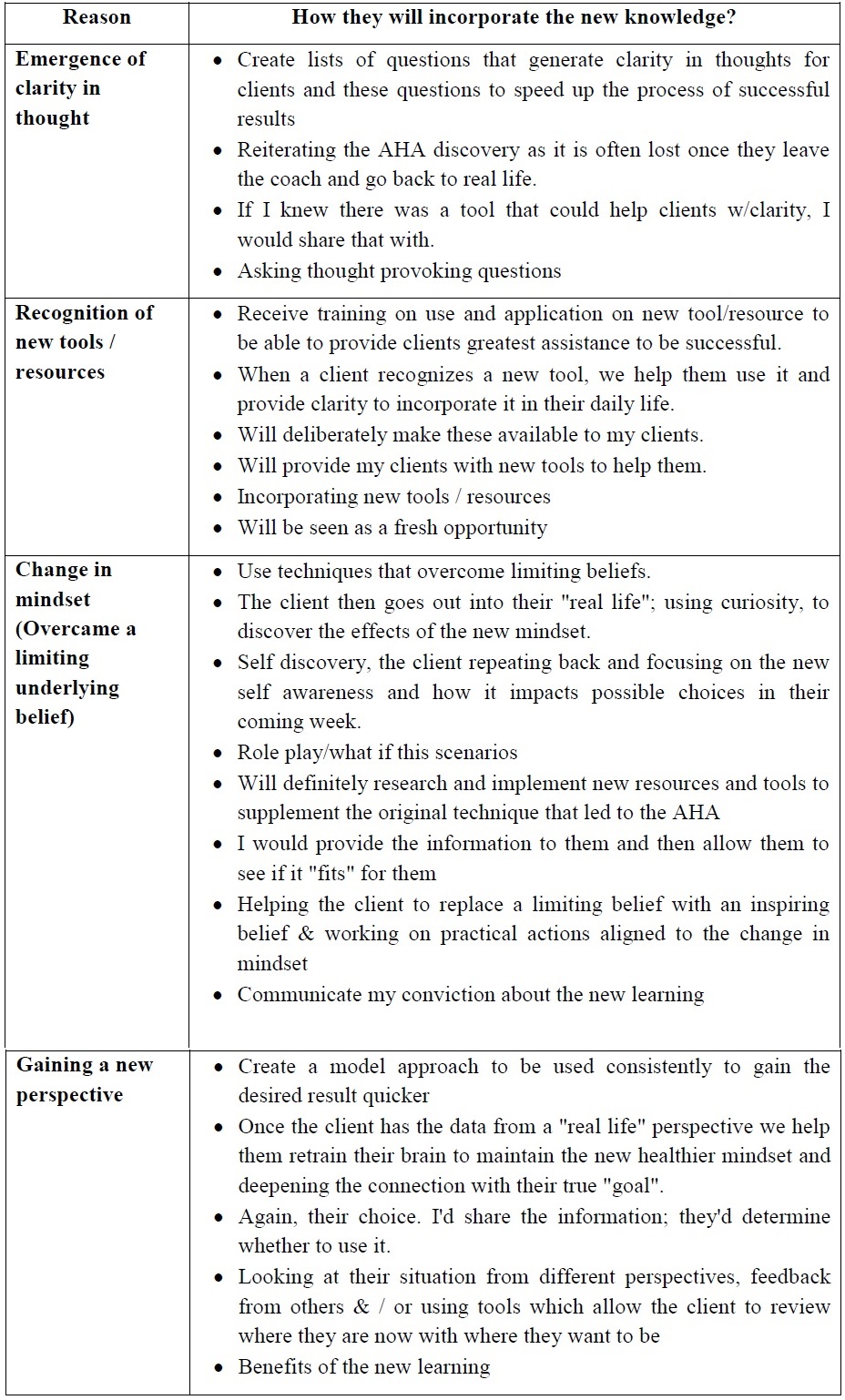Qualitative / textual responses
6. Reasons for successful outcomes
The textual responses to the coaching on what lead in particular in to successful outcomes (e.g. goals / resolving concerns, etc.) are summarized in the table 1 below. Analysis of the reasons indicates that powerful questioning is by far the most quoted reason followed by reframing, listening and providing a non-judgmental and trusting space. Building self awareness and accountability are other commonly quoted reasons. It is interesting to note that both the clients a well as coaches see powerful questioning as the prime reason.
Table 1 – Reasons for successful outcomes
7. What will change for them (coaches)?
Here, the coaches were asked to assume that they were provided with consolidated information collected as a result of a study. Overall the response from the coaches was that they would incorporate the new body of knowledge in their natural style / process of coaching. A summary of the responses is included in Table 2.
Table 2 – What will change?
DISCUSSION
The above study was primarily focused on two aspects – Occurrence of successful outcomes and emergence of AHA moments. The study was also aimed at finding the reasons for the emergence or non emergence of the AHA moments and of successful outcomes.
Expectedly, almost all the respondents (clients as well as coaches) reported, the emergence of an AHA! moment, as well as successful outcomes due to coaching. Gaining a new perspective was the most important reason quoted by the respondents (50% of the clients, 35% of the coaches). Change in mindset was the next most quoted reason (33 % clients and 32% of the coaches). Notably, none of the coaches quoted recognition of new tools as a reason.
Interestingly, almost an equal number of coaches indicated that they will (38%) and will not (36%) coach to a specific reason. Significantly, in response to the next question, none of the coaches (0%) said that they will coach consciously and specifically for a particular outcome and 81% indicted that they will coach to their existing natural style and model and use the newly gained knowledge as and when required. This in a way contradicts the response to the earlier question and needs to be probed further. However, it may be safe to conclude that new information / knowledge gained from empirical and scientific research will definitely add to the efficacy of the coaching process.
Analysis of the responses to the other important aspect of the study – reasons for successful outcomes confirms the widely held belief that powerful questioning is one of the most important parameter for successful outcomes. Reframing, listening and providing a non-judgmental and trusting space, helping build self awareness and accountability are other commonly quoted reasons.
SUMMARY & CONCLUSIONS
As the field of coaching expands and the demand for it increases, it will become vital to understand the reasons for building successful outcomes as a result of coaching. What works in coaching will probably be the most widely asked question both in daily practice as well as in the research domain. As stated earlier, this study was initiated and carried out to broadly understand the reasons for the success of coaching and more specifically to understand the role of AHA moments in coaching. It must be noted that the above study is very preliminary in nature and needs to be followed up by more extensive research.
In conclusion, the results of the study indicate that AHA moments do occur in almost all coaching sessions and that gaining a new perspective was by far the most quoted reason for occurrence of such moments. Powerful questioning followed by effective listening is a vital tool in gaining successful outcomes through the process of coaching. Given fresh inputs, coaches are more than willing to incorporate this information in their future coaching process.
REFERENCES
Course notes of International Coach Academy (2002), Coaching - what is it? Retrieved in Jan 2012 from
Griffiths & Campbell (2009), Discovering, applying and integrating: The process of learning in coaching.
International Journal of Evidence Based Coaching and Mentoring Vol. 7, No. 2, August 2009 Page 16. 3. Mark Jung-
Beeman (2004, April 13) Scientists Explain 'Aha!' Moments Brain Activity Differs When Creative Insight Takes Hold.
Retrieved on April 15, 2012 from http://men.webmd.com/news/20040413/scientists-explain-aha-moments.
Strauss and Corbin (1998), Basics of Qualitative Research Techniques and Procedures for Developing Grounded Theory, (2nd edition) Sage Publications: London
Vikki G. Brock (2008) Grounded theory of the roots and emergence of coaching, Unpublished dissertation submitted for the Degree Doctor of Philosophy in Coaching and Human Development, International University of Professional Studies Maui.
Wikipedia (2102, April 25), Eureka Effect. Retrieved on April 28, 2012 from http://en.wikipedia.org/wiki/Eureka_effect

